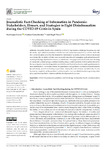Mostrar o rexistro simple do ítem
Journalistic Fact-Checking of Information in Pandemic: Stakeholders, Hoaxes, and Strategies to Fight Disinformation during the COVID-19 Crisis in Spain
| dc.contributor.author | López-García, Xosé | |
| dc.contributor.author | Costa-Sánchez, Carmen | |
| dc.contributor.author | Vizoso, Ángel | |
| dc.date.accessioned | 2021-03-17T08:56:50Z | |
| dc.date.available | 2021-03-17T08:56:50Z | |
| dc.date.issued | 2021 | |
| dc.identifier.citation | López-García, X.; Costa-Sánchez, C.; Vizoso, Á. Journalistic Fact-Checking of Information in Pandemic: Stakeholders, Hoaxes, and Strategies to Fight Disinformation during the COVID-19 Crisis in Spain. Int. J. Environ. Res. Public Health 2021, 18, 1227. https://doi.org/10.3390/ijerph18031227 | es_ES |
| dc.identifier.issn | 1660-4601 | |
| dc.identifier.uri | http://hdl.handle.net/2183/27545 | |
| dc.description | Este artigo pertence ao Special Issue: COVID-19 Global Threat: Information or Panic | es_ES |
| dc.description.abstract | [Abstract] The public health crisis created by COVID-19 represents a challenge for journalists and the media. Specialised information in healthcare and science has turned into a need to deal with the current situation as well as the demand for information by society. In this context of increased uncertainty, the circulation of fake news on social networks and messaging applications has proliferated, producing what has been known as ‘infodemic’. This paper is focused on the fact-checking of journalistic content using a combined methodology: content analysis of information denied by the main Spanish fact-checking platforms (Maldita and Newtral) and an in-depth questionnaire to these stakeholders. The results confirm the quantitative and qualitative evolution of disinformation. Quantitatively, more fact-checking is performed during the state of alarm. Qualitatively, hoaxes increase in complexity as the pandemic evolves, in such a way that disinformation engineering takes place, and it is expected to continue until the development of a vaccine. | es_ES |
| dc.description.sponsorship | This article has been developed within the research project “Digital Native Media in Spain: Storytelling Formats and Mobile Strategy (RTI2018-093346-B-C33)”, funded by the Ministry of Science, Innovation and Universities (Government of Spain) and co-funded by the European Regional Development Fund (ERDF). Furthermore, Ángel Vizoso is also beneficiary of the Training University Lecturers’ Program (FPU), funded by the Spanish Ministry of Science, Innovation and Universities (Government of Spain) | |
| dc.language.iso | eng | es_ES |
| dc.publisher | MDPI | es_ES |
| dc.relation | info:eu-repo/grantAgreement/AEI/Plan Estatal de Investigación Científica y Técnica y de Innovación 2017-2020/RTI2018-093346-B-C33/ES/CIBERMEDIOS NATIVOS DIGITALES EN ESPAÑA: FORMATOS NARRATIVOS Y ESTRATEGIA MOVIL/ | |
| dc.relation.uri | https://doi.org/10.3390/ijerph18031227 | |
| dc.rights | Atribución 4.0 International | es_ES |
| dc.rights.uri | http://creativecommons.org/licenses/by/4.0/ | * |
| dc.subject | COVID-19 | es_ES |
| dc.subject | Journalism | es_ES |
| dc.subject | Pandemic | es_ES |
| dc.subject | Fact-checking | es_ES |
| dc.subject | Coronavirus | es_ES |
| dc.subject | Health | es_ES |
| dc.subject | Communication | es_ES |
| dc.subject | Spain | es_ES |
| dc.title | Journalistic Fact-Checking of Information in Pandemic: Stakeholders, Hoaxes, and Strategies to Fight Disinformation during the COVID-19 Crisis in Spain | es_ES |
| dc.type | info:eu-repo/semantics/article | es_ES |
| dc.rights.access | info:eu-repo/semantics/openAccess | es_ES |
| UDC.journalTitle | International Journal of Environmental Research and Public Health | es_ES |
| UDC.volume | 18 | es_ES |
| UDC.issue | 3 | es_ES |
| UDC.startPage | 1 | es_ES |
| UDC.endPage | 15 | es_ES |
| dc.identifier.doi | 10.3390/ijerph18031227 |
Ficheiros no ítem
Este ítem aparece na(s) seguinte(s) colección(s)
-
GI-CCI - Artigos [74]






